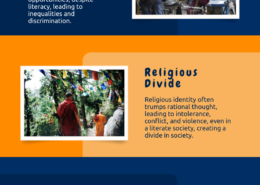In what ways do Indian family structures combine elements of the modern world with traditional values?
Trends in Labor Migration in and Outside India Over the Last Four Decades **1. Internal Migration Trends Over the past four decades, internal labor migration in India has seen significant changes. The trend has shifted from predominantly rural-to-rural migration to a surge in rural-to-urban migratioRead more
Trends in Labor Migration in and Outside India Over the Last Four Decades
**1. Internal Migration Trends
Over the past four decades, internal labor migration in India has seen significant changes. The trend has shifted from predominantly rural-to-rural migration to a surge in rural-to-urban migration. Rapid urbanization and industrialization have driven this shift, with individuals moving from rural areas to cities in search of better employment opportunities. For example, states like Bihar and Uttar Pradesh have seen large-scale migration to metropolitan areas such as Delhi and Mumbai. Additionally, migration patterns are increasingly influenced by the development of Special Economic Zones (SEZs) and infrastructure projects, creating new migration hubs.
**2. International Migration Trends
International labor migration from India has also evolved considerably. The Middle East has been a prominent destination for Indian migrant workers, driven by demand for low-skilled labor in sectors like construction and domestic work. Recent trends show an increasing movement towards Western countries such as the United States, Canada, and Australia. This shift is largely due to rising demand for high-skilled labor in technology and professional sectors. For instance, the H-1B visa program in the US has attracted a significant number of Indian IT professionals.
**3. Recent Examples and Changes
Recent developments include the impact of COVID-19, which disrupted migration patterns globally. The pandemic led to the reverse migration of millions of workers from cities to their native villages due to job losses and lockdowns. Additionally, the Government of India has initiated policies like the Pradhan Mantri Garib Kalyan Yojana to support migrant workers and address their vulnerabilities.
**4. Policy and Economic Factors
Policies such as the National Skill Development Mission and Mahatma Gandhi National Rural Employment Guarantee Act (MGNREGA) aim to improve employment opportunities and reduce the necessity for migration. Economic factors like globalization and digital transformation are also influencing labor migration trends, with a growing emphasis on remote work and digital nomadism.
In summary, labor migration trends within and outside India have evolved due to urbanization, international opportunities, and recent global events like the COVID-19 pandemic. These changes reflect shifting economic, social, and policy dynamics influencing migration patterns.
See less

Family structures in India reflect a unique blend of traditional values and modern influences, as they evolve in response to social, economic, and cultural changes. While India has long been known for its strong emphasis on joint families and collective living, modern influences like urbanization, gRead more
Family structures in India reflect a unique blend of traditional values and modern influences, as they evolve in response to social, economic, and cultural changes. While India has long been known for its strong emphasis on joint families and collective living, modern influences like urbanization, globalization, and changing gender roles have reshaped family dynamics. The result is a spectrum of family structures, from traditional extended families to more nuclear or even individualistic setups.
1. Joint Families: A Traditional Foundation
2. Nuclear Families: The Rise of Individualism
3. Changing Gender Roles
4. Marriage and Family Formation
5. Elder Care and Family Responsibilities
6. Impact of Globalization and Technology
7. LGBTQ+ Families and Evolving Definitions of Family
8. Intergenerational Conflicts
Conclusion
Family structures in India are evolving, reflecting the complex interplay between deeply rooted traditional values and the influences of modernization, urbanization, and globalization. While traditional family systems like the joint family still persist, particularly in rural areas, urban India is witnessing a rise in nuclear families, changing gender roles, and more individualistic lifestyles. Yet, even as family structures shift, the importance of family ties, respect for elders, and collective identity remains central to Indian society, creating a dynamic blend of continuity and change.
See less